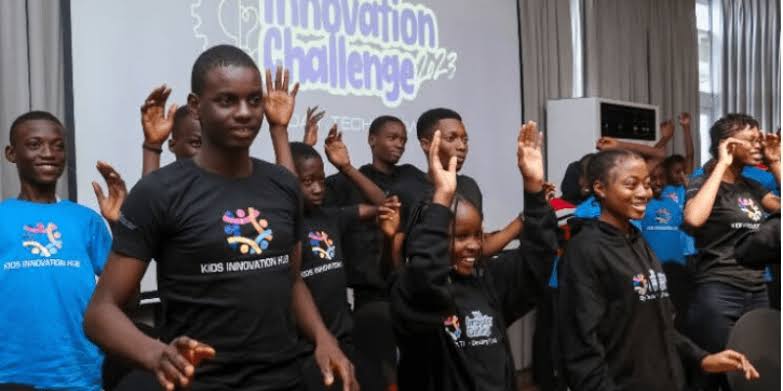Students from Nigeria who participated in the “Kids Innovative Challenge” in 2023 built an intelligent waste pit.
IT enthusiasts participated in the challenge at the Radisson Blu on Victoria Island in Lagos, which the Destiny Trust Foundation organized.
At this event, Oluyemi Sopade, the first-place team GTC, and other young tech innovators showed off their new ideas. GTC won the Challenge with an intelligent compost system built on Arduino that turns food waste into fertiliser.
Read also: Ecobank Group launches Fintech Challenge 2023
The innovative garbage pit built by Nigerian kids
It is easy and familiar for organic garbage to break down in a compost pit. It means digging a hole in your yard or lawn and putting organic trash in it. Things like the peels of fruits and vegetables, grass clippings, leaves, and other things that break down naturally.
These things break down naturally in the waste pit. Microorganisms, insects, and earthworms break down organic matter into soil full of nutrients. This process adds nutrients to the soil in your yard, improves its structure, and makes it hold more water.
An innovative compost pit brings composting into the modern age using sensors, controls, and automation. It keeps a close eye on composting and makes it better. Key features include remote tracking, sensors that check temperature and humidity, real-time data transmission to controllers, automation for turning and aeration, and ease of use.
These methods are essential because they create ideal conditions and cut down on manual labour. An innovative compost pit makes composting easier, faster, and more environmentally friendly. This helps with both gardening and trash management.
In the competition, seven teams of Nigerian students competed for cash prizes, brand-new computers, access to courses to improve their tech skills, and a one-year mentoring programme to help them grow and improve their ideas.
Meet other competitors
Baby-watch team
The Teenage Baby-watch team competed with a revolutionary infant monitoring system. The technology lets nursing mothers remotely monitor their baby’s activities and well-being.
The Lafiya App team
This team created a micro-insurance platform for low-income children to afford healthcare.
The Lafiya App team’s initiative targets vulnerable people, making it stand out. This affordable solution includes routine check-ups and treatments, and contemporary technology reduces administrative processes to improve access to essential healthcare services.
The Medset App team
This team established a telemedicine platform to help doctors and patients communicate directly, decreasing physical distance that could delay healthcare access.
This powerful software connects users with medical specialists and delivers vital resources, including medical advice, medicines, and accurate diagnosis. This revolutionary strategy makes healthcare more convenient and accessible, allowing people to get the care they need quickly and efficiently regardless of location or physical restrictions.
The Normastics team
Normastics’ revolutionary platform connects farmers and buyers, easing agricultural trading, transportation, and logistics. This comprehensive solution solves various key agricultural supply chain issues.
The software optimizes logistics and transportation to get items from farm to market quickly. This saves transportation expenses and food spoilage.
Users can also track and manage their goods on the Normastics platform. Transparency improves supply chain trust and accountability, benefiting farmers and purchasers.
The Normastics team’s innovation could improve food security, farmer income, and regional agricultural trade efficiency by solving these core agricultural sector concerns. It shows how technology can revolutionise sectors and boost the economy.
The Cradlecare Africa
The Cradlecare Africa team created a comprehensive record-keeping system for Nigerian children aged 0–17 to manage their medical information. This technique has several benefits beyond its immediate use, breaking with standard record-keeping procedures.
The system digitizes and centralizes medical records, replacing paper records with efficient electronic ones. This transformation protects vital medical data from loss and destruction and keeps it organized, safe, and accessible.
Second, the system is designed for children’s healthcare needs and stores immunization, check-ups, medical history, and other health data. Comprehensive record-keeping helps healthcare providers provide timely and accurate care, improving child health outcomes.
The Cradlecare Africa system may allow healthcare providers and organisations to share medical records. This seamless information interchange can speed diagnosis and treatment, especially in crises, saving lives.
The benefits of this approach go beyond healthcare. It provides aggregated, anonymised data on health trends to help policymakers make informed decisions and allocate resources for public health projects.
Digital record-keeping reduces administrative responsibilities for healthcare providers, eliminating paperwork and allowing them to focus on patient care. This efficiency can improve healthcare services.
The Learnovation team
The Learnovation platform addresses rural children’s educational gaps. It has many benefits beyond individual learning. Access to quality education is a significant benefit. Learnovation gives rural children high-quality primary education to develop their talents and knowledge. This possibility could alter education by removing barriers.
Quality education from Learnovation builds communities. Educated people improve healthcare, economic development, and social well-being in their communities.
Learnovation improves work chances and economic mobility, creating economic opportunity. Children can base their careers on quality elementary education, improving their earnings and economic well-being.
Digital literacy is critical in today’s technology-driven society, and Learnovation uses digital tools and resources to teach rural youngsters. Their schooling and professions will benefit from these digital abilities.
Teens need to learn how to use technology because it helps them be creative and figure out how to solve problems. Also, innovation and tech fluency make it easier for teens to find creative solutions to world problems like climate change and health care.




